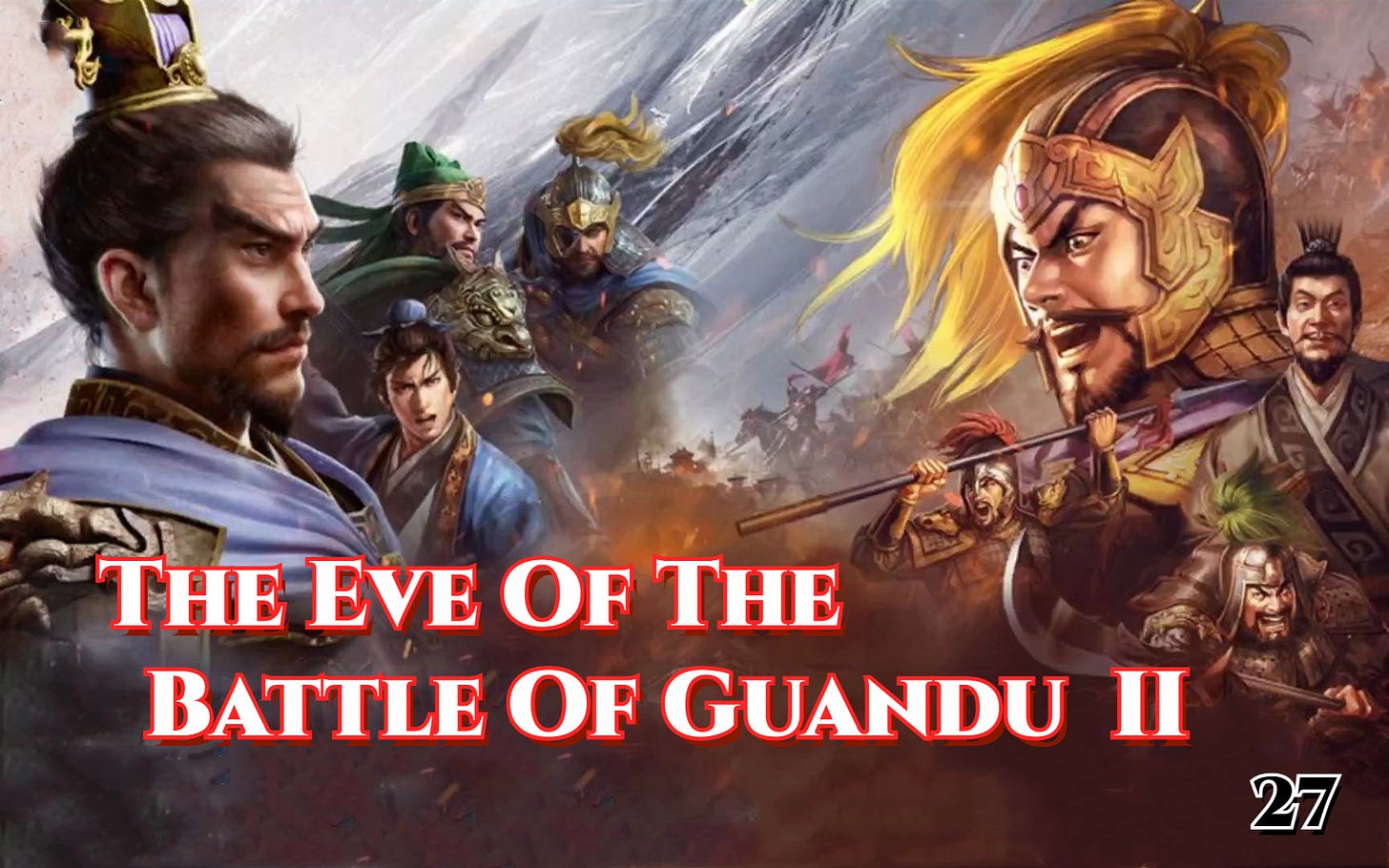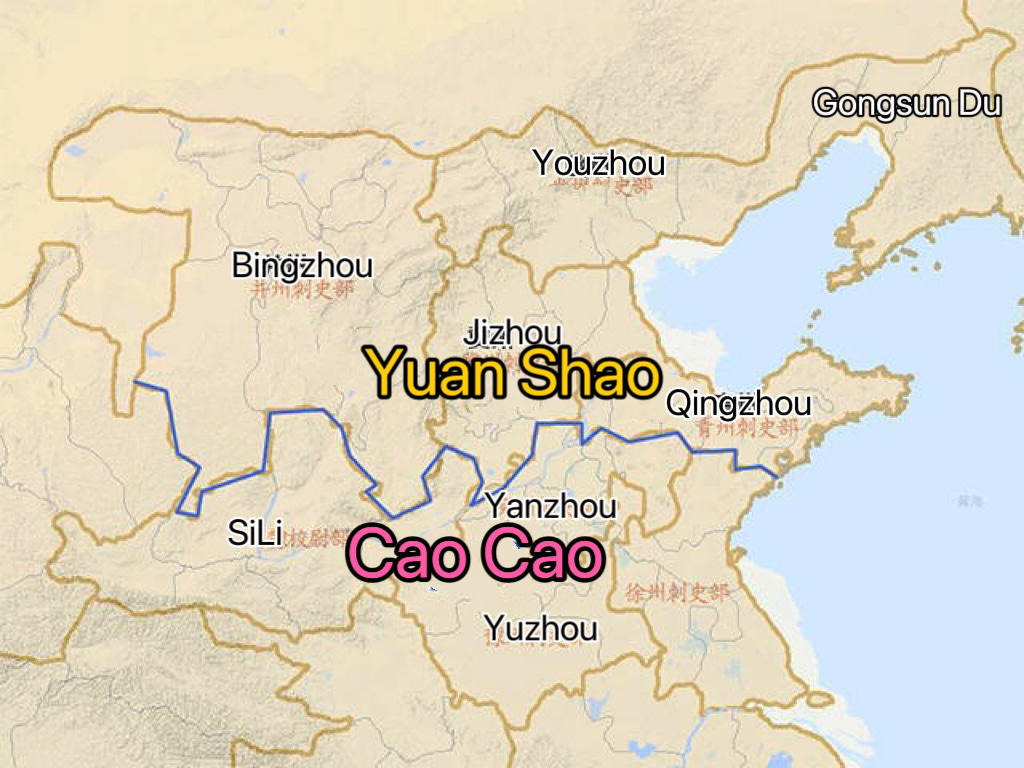The Battle of Guandu 2 - Comparison of strength between Cao Cao and Yuan Shao
Three Kingdoms 27
At the end of 199, Cao Cao personally led the main force into Guandu官渡, and he built a stronghold to prepare for the war.
Before Yuan Shao and Cao Cao officially fight, let's take a look at the balance of forces between the two sides.
From the perspective of territory, Yuan Shao held the four Province of Jizhou冀州, Qingzhou青州, Youzhou幽州, and Bingzhou并州, while Cao Cao also had the four Province of Yanzhou兖州, Yuzhou豫州, Xuzhou徐州 and Sili司隶. Although both of them have the land of four Provinces,but they were all uncomplete.
First of all, the Bingzhou of Yuan Shao,had totally 9 commanderies in Eastern Han, which was a veritable large Province, but by the end of the Eastern Han Dynasty, with the Southern Xiongnu匈奴 and other nomad people in the north gradually moving south,most part of the province has actually been barbarized.
A few years ago, Yuan Shao sent his nephew Gao Gan高干 to take over Bingzhou as the provincal governor, but in fact, only Taiyuan太原 and Shangdang上党 were really controlled by Yuan Shao.
The second was Youzhou, the territory of Youzhou in the Eastern Han was also very large, including the current city of Beijing, northern Hebei, southern Liaoning and even the northwestern Korea, together with Pyongyang, the capital of modern DPRC, all under Youzhou.
Youzhou had a total of 11 Commandaries, and Yuan Shao actually only had half of Youzhou after eliminating Gongsun Zan公孙瓒, because the another half was in Gongsun Du's 公孙度 hands and was not under Yuan Shao's jurisdiction.
In this way, Jizhou and Qingzhou were completely integrated under Yuan Shao, while Qingzhou was the hardest hit area of the Yellow Turban Rebellion, which had long been dilapidated and sparsely populated under years of war.
Therefore, the most important province of Yuan Shao is still Jizhou.But even so, Cao Cao was still much more shabby than Yuan Shao.
Sili of Cao Cao, that was, the area of several commanderies around the former capital Luoyang洛阳, these area had long been spoiled by Dong Zhuo董卓 and has become a no-man's land.
And Yuzhou is Yuan Shao's hometown, and people's hearts are not on Cao Cao's side at all, which was why Yuan Shao raised his arms and the whole territory of Yuzhou basically responded. Only Yingchuan commandery can contribute to Cao Cao,Cao Cao's most important subordinate and basically partner,Xun Yu’s hometown,and Yingchaun is Where the then capital of Eastern Han,Xuchang located.
Not to mention Xuzhou, although Lu Bu吕布 was killed, Cao Cao had created too many sins in Xuzhou, and if Cao Cao was handed over to the people of Xuzhou, it was estimated that he would have to be skinned in less than a minute
Therefore, the one that Cao Cao's side can make most contribution to is Yanzhou, but Yanzhou and Jizhou are obviously not of the same level, and Yanzhou has long been empty and tired after many wars, and it is still difficult to protect itself.
However, Jizhou was the richest Province among the thirteen Provinces in China at that time, not only densely populated, with abundant troops, but also a gathering of famous Scholars, and sufficient food.
It was no wonder that later, after Cao Cao got Jizhou and saw the household registration, he couldn't suppress the excitement in his heart, and soon he move his headquarters there.
It was really staggering that Jizhou alone could mobilize an army with 300,000 soldiers, so in the battle of Guandu, Yuan Shao sent 100,000 elite infantry and 10,000 cavalry, which obviously did not use all his strength.
While Cao Cao had only entire 60,000 or 70,000 soliders , and he had to divide his troops to defend the surrounding area,only about 30,000 men could be used on the battlefield of Guandu.
Therefore, looking at the strength at that time, there was no doubt that Yuan Shao was stronger and Cao Cao was weaker,In fact, the reason for Cao Cao's headache was not that he couldn't fight, but that he didn't want to fight so soon.
Because Cao Cao's territory had expanded too rapidly in recent years, Sili, Yuzhou and Xuzhou were all newly occupied areas, and they urgently needed to rest and raise the people to consolidate their rule, once the war was removed and the development time was obtained, with the unique agricultural foundation in the Central Plains, it will definitely be able to slowly narrow the strength gap with Yuan Shao or even surpass.
Therefore, Yuan Shao choosed to strat the war with Cao Cao at this time, there was no problem, and Cao Cao was the one being forced to fight.
As early as June 199, Cao Cao heard that Yuan Shao's younger half brother Yuan Shu,wanted to go north to Qingzhou to join Yuan Shao's eldest son Yuan Tan袁潭, so he sent Liu Bei and his general Zhu Ling朱灵 to lead troops to intercept the attack.
However, at the end of the same year, after the Cao army entered Guandu, Liu Bei heard the news that Yuan Shu had gone back and been dead in Shouchun寿春, and he asked Zhu Ling to lead his troops back to Xuchang first, while he led his own troops to make a surprise attack to capture Xiapi下邳 of Xuzhou and killed Che Zhou车胄,the Provincial governor of Xuzhou appointed by Cao Cao.
Liu Bei ordered Guan Yu to stay in Xiapi, while he remained in Xiaopei小沛.
On the one hand,Liu Bei united with Yuan Shao to the north, and on the other hand, he openly raised the banner of opposing Cao Cao to recruit troops, and by virtue of the hatred of the people of Xuzhou for Cao Cao, Liu Bei soon recruited a force of more than 10,000 men.
After getting the news, Cao Cao is going to explode in anger, most of Yuzhou reversed, Xuzhou was lost, and before the battle was fought,almost two of the four Provinces in Cao Cao's hands were gone,he couldn't figure out why Liu Bei betrayed him under such generous treatment.
However, now that the war was imminent, Cao Cao and his right-hand men were all stationed along the Yellow River, so Cao Cao only sent Liu Dai刘岱, and Wang Zhong王忠, to lead troops to the conquest, but they were quickly repulsed by Liu Bei.
In the first month of 200 AD, the Clothes-belts-edict incident was leaked, Dong Cheng董承, and others ,who tried to killed Cao Cao according to the emperor's secret order,were failed and all killed by Cao Cao.
So Yuan Shao finally obtained a justified reason for war, he declared that he was fighting against Cao Cao with the secret blood edict of Emperor Xian, and ordered a famous scholar Chen Lin陈琳 to write a essay to denounce Cao Cao as a traitor, thus Yuan Shao and Cao Cao officially broke up and publicly declared a war.
When Cao Cao learned that Liu Bei had also participated in the plot of the Clothes-Belt-Edict, he was furious and immediately decided to personally lead troops to the fight Liu Bei in Xuzhou.
Cao Cao chose to leave Guandu at this time to go to Xuzhou, which was a great risk, and once Yuan Shao took advantage of Cao Cao's absence, raised a large army to cross the river to fight a decisive battle, or sent heavy troops to attack Xuchang, then Cao Cao would probably have to be defeated early.
But in order to remove the nail like Liu Bei, and avoid falling into the quagmire of two-front battle, Cao Cao finally decided to take a gamble.
In the first month of 200 AD, Cao Cao personally led his army to blitz Xuzhou, which created a battle that may be the most humiliating in Liu Bei's military career.
Although Liu Bei had repeatedly lost battles before, he at least dared to fight, this time, he did not expect that Cao Cao would personally lead his troops to come, and after seeing Cao Cao's banner from a distance, Liu Bei threw down his troops and fled to Qingzhou to join Yuan Tan.
Liu Bei's escaping really harmed Guan Yu behind him, soon Cao Cao surrounded Xiapi, Guan Yu had few soldiers,he had to choose to surrender.
In this battle, Cao Cao won a complete victory, not only capturing Liu Bei's family and soldiers, but also capturing the mighty general Guan Yu.
Cao Cao then led his troops to quickly return to the front line of Guandu, and on the way back, Cao Cao kept looking to the west with anxiety, hoping that the south bank of the Yellow River would still belong to him at this time.







